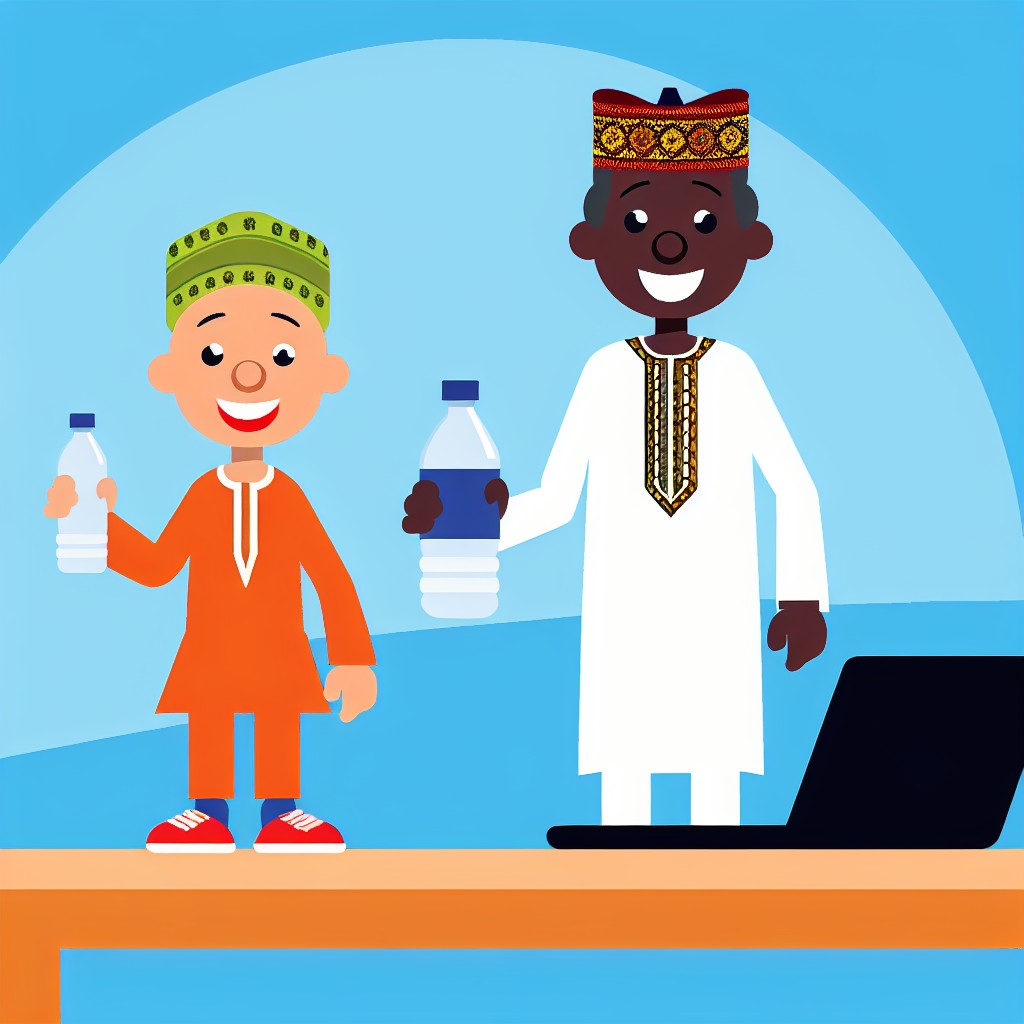Overview of Hydration and Its Role in Children’s Health
Understanding Hydration
Water is essential for all living beings.
Water is especially important for children.
Children’s bodies contain a high percentage of water.
This high water content makes hydration vital.
Proper hydration supports growth and development.
It also supports overall wellbeing.
Moreover, water helps regulate body temperature during physical activities.
Benefits of Adequate Hydration for Children
Good hydration enhances concentration in kids.
It also improves cognitive function.
Hydration aids digestion and prevents constipation effectively.
Additionally, water supports kidney function.
Water helps remove toxins from the body.
Therefore, staying hydrated helps Nigerian children maintain energy throughout the day.
Risks of Dehydration in Children
Dehydration causes fatigue in children.
It also leads to dizziness and headaches.
Parenting Made Just for You
Get personalized Parenting Solutions tailored to your child’s needs. Transform your parenting journey with expert guidance in 1-3 days.
Get StartedDehydration may impair immune function.
This impairment makes children more susceptible to illnesses.
Consequently, dehydration negatively impacts academic performance.
It also reduces physical activity capability.
Thus, it is critical to encourage regular water intake among Nigerian kids.
Factors Affecting Hydration in Nigerian Children
Climate plays a significant role in hydration.
Nigeria’s hot weather increases water loss.
Children who participate in outdoor games lose more fluids rapidly.
Access to clean drinking water varies by region and community.
Therefore, parents and schools must promote hydration awareness consistently.
Strategies for Promoting Healthy Hydration Habits
Routine water breaks help children remember to drink regularly.
Offering appealing water bottles can motivate kids to drink more often.
Schools and caregivers should educate children on hydration importance.
In addition, incorporating water-rich foods supports overall fluid intake effectively.
Unveil the Perfect Name that Tells Your Family's Story
Let us help you find a name that embodies your family's values, traditions, and dreams. Our personalized consultation weaves cultural insights to create a name that's uniquely yours.
Get StartedCommon Causes of Dehydration Among Nigerian Children
Impact of Climate and Weather
Nigeria experiences hot and humid weather for most of the year.
This climate increases children’s fluid loss through sweat significantly.
As a result, children require frequent water intake to stay hydrated.
Additionally, many children play outdoors under the sun, raising dehydration risks.
Limited Access to Safe Drinking Water
Many communities in Nigeria struggle with access to clean water sources.
In some areas, water comes from contaminated wells or rivers.
Children consuming unsafe water often avoid drinking enough liquid.
Moreover, caregivers sometimes lack knowledge about the importance of hydration.
High Prevalence of Illnesses
Diseases like diarrhea and malaria commonly affect Nigerian children.
These illnesses cause rapid loss of fluids and electrolytes from the body.
Consequently, sick children require additional fluids to prevent dehydration.
Prompt medical care and hydration support are essential in these cases.
Poor Dietary Practices
Some children consume high amounts of sugary drinks instead of water.
Processed beverages do not hydrate the body as effectively as clean water.
Furthermore, inadequate intake of fruits and vegetables can reduce natural hydration.
Parents and schools must encourage healthy eating and drinking habits.
Socioeconomic and Cultural Factors
Economic challenges hinder many families from providing sufficient water daily.
Traditional beliefs sometimes discourage drinking water during certain activities.
Such practices increase children’s vulnerability to dehydration.
Community education can help change misconceptions and promote hydration.
Health Risks Associated with Inadequate Water Intake
Dehydration and Its Effects on Children
Inadequate water intake often leads to dehydration in children.
Dehydration reduces energy levels and impairs concentration.
Children may struggle with learning and daily activities as a result.
Moreover, dehydration can cause headaches and dizziness.
Persistent dehydration increases the risk of heat-related illnesses.
Impact on Physical Health
Insufficient hydration weakens the immune system in children.
This makes them more vulnerable to infections like malaria and respiratory illnesses.
Inadequate water intake strains the kidneys, potentially causing long-term damage.
Children may also experience constipation due to low water consumption.
Hydration plays a vital role in maintaining proper digestion and waste elimination.
Cognitive and Emotional Consequences
Children who do not drink enough water often suffer from reduced cognitive function.
This condition adversely affects memory, attention, and problem-solving abilities.
Dehydration can lead to mood swings and irritability as well.
Proper hydration supports both mental wellbeing and emotional stability.
Factors Increasing Hydration Challenges in Nigeria
High temperatures and frequent outdoor activities increase children’s water needs.
Limited access to clean water sources makes adequate hydration challenging.
Lack of awareness about hydration risks contributes to insufficient water intake.
Schools and caregivers must promote regular water drinking habits.
Community programs can improve access to safe drinking water for Nigerian children.
Learn More: How to Encourage Picky Eaters to Enjoy Nutritious Meals
Impact of Hydration on Cognitive Development and School Performance
Link Between Hydration and Brain Function
Proper hydration plays a crucial role in maintaining brain health in children.
When children like Tunde Adeboye stay hydrated, their concentration improves significantly.
Moreover, water supports the delivery of nutrients essential for cognitive function.
Research shows hydrated brains process information faster and with greater accuracy.
Consequently, Nigerian children who drink enough water demonstrate better memory retention.
Effect of Hydration on Attention and Learning
Children often struggle with focus when they are dehydrated during lessons.
For example, Adeola Emeka’s teachers observed improved attentiveness after encouraging regular water intake.
Additionally, hydration helps regulate mood, which influences classroom behavior positively.
Therefore, students can follow instructions more easily and participate actively in discussions.
Schools that promote drinking water contribute to an enhanced learning environment.
Hydration and Academic Achievement
Consistent water consumption correlates with higher test scores among schoolchildren.
In Lagos, a study by Bright Futures Foundation linked hydration to improved exam performance.
Teachers like Mrs. Funke Olatunji report fewer complaints of headaches when students stay hydrated.
Such health improvements enable children to attend school regularly and engage fully.
Ultimately, adequate hydration supports academic success in various subjects.
Practical Tips for Improving Hydration in Schools
Parents and educators can promote water consumption through simple strategies.
First, provide easy access to clean drinking water inside classrooms and playgrounds.
Next, encourage children to carry reusable water bottles daily.
Also, educate students on the benefits of hydration using relatable stories or role models.
Finally, organize hydration breaks during long study sessions or physical activities.
Community Efforts Supporting Child Hydration
Organizations like NigerWater Foundation collaborate with schools to raise awareness on hydration.
They sponsor water stations and provide educational materials tailored to Nigerian kids.
Additionally, health workers visit communities to emphasize hydration’s role in child development.
Parents such as Chinedu Okoro praise these efforts for improving their children’s wellbeing.
Together, these initiatives help foster a culture of healthy hydration among young learners.
Learn More: Immune-Boosting Nigerian Recipes to Keep Your Kids Healthy All Year
Cultural and Environmental Factors Affecting Children's Hydration in Nigeria
Cultural Influences on Hydration Practices
Nigerian families often emphasize traditional drinks during meals and festivals.
Some communities favor sweetened beverages over plain water.
Beliefs about water consumption vary across different ethnic groups.
Some parents encourage tea or herbal infusions instead of daily water intake.
Such preferences influence how frequently children drink water throughout the day.
Communal eating habits affect when and how kids hydrate.
Environmental Challenges Impacting Access to Clean Water
Many parts of Nigeria face irregular water supply due to climate conditions.
Water scarcity becomes a serious issue, especially during the dry season.
Families may rely on stored or contaminated water sources as a result.
Urban areas struggle with inadequate infrastructure to provide safe drinking water.
Rural communities depend on wells or rivers with variable water quality.
Such environmental factors contribute to inconsistent hydration among children.
Effects of Climate and Temperature on Children's Hydration
Nigeria's hot climate increases children's daily fluid requirements significantly.
Physical activity combined with heat leads to faster dehydration.
Kids playing outdoors need regular access to water.
Water availability during school hours affects hydration choices and habits.
Heat stress can reduce appetite and thirst sensations in children.
Parents and teachers must monitor hydration to prevent health complications.
Strategies to Improve Hydration Among Nigerian Children
Community education programs raise awareness about the importance of drinking water.
Schools implement water breaks and provide safe drinking facilities.
Local leaders encourage the use of affordable water purification methods.
Families adopt habits of carrying water bottles during outdoor activities.
Health workers promote culturally sensitive messages supporting hydration.
Combined efforts aim to overcome cultural and environmental obstacles.
Gain More Insights: Building Healthy Eating Habits for Nigerian Children at Any Age
Recommended Daily Water Intake for Nigerian Kids Based on Age and Activity
Daily Water Needs by Age Group
Children’s water requirements vary according to their age.
Young children need less water than older kids.
Preschoolers aged 1 to 3 years should drink about 1.3 liters daily.
Kids aged 4 to 8 years require around 1.7 liters of water each day.
Older children between 9 and 13 years old need more water, about 2.4 liters.
Teenagers aged 14 to 18 years should aim for approximately 3.3 liters daily.
Adjusting Intake According to Activity Level
Physical activity significantly increases water requirements.
Active children lose more water through sweat during play and sports.
Therefore, kids in sports or outdoor activities should drink extra fluids.
For light activity, children should maintain their baseline water intake.
During moderate to intense exercise, they need at least 500 milliliters extra per hour.
This additional hydration helps prevent dehydration and maintains energy levels.
Factors Influencing Hydration Needs
Climate affects how much water a child requires daily.
In Nigeria’s hot and humid regions, kids lose more fluids through sweat.
Thus, children living in these areas must increase their water intake.
Health conditions like fever or diarrhea also raise hydration needs.
Parents and caregivers should monitor signs of dehydration closely.
Tips for Encouraging Adequate Hydration
Offer water regularly throughout the day, not only when kids feel thirsty.
Provide appealing water bottles with favorite colors or characters.
Include hydrating fruits like watermelon and oranges in their diet.
Limit sugary drinks that can reduce water consumption.
Educators can promote water breaks during school activities.
Consistent hydration supports overall wellbeing and healthy growth.
Uncover the Details: Tips for Creating a Balanced Diet with Common Nigerian Ingredients

Strategies for Parents to Encourage Regular Water Consumption
Create a Fun and Attractive Drinking Environment
Parents should provide colorful and appealing water bottles for their children.
Using bottles with popular cartoon characters grabs kids’ attention quickly.
Moreover, adding reusable straws makes drinking water more enjoyable for children.
Encouraging children to personalize their water bottles enhances their interest.
Incorporate Water into Daily Routines
Establish specific times for water breaks during the day.
For instance, ensure children drink water after waking up and before meals.
This routine forms healthy habits that children easily adopt over time.
Parents can also remind kids gently but consistently about hydration needs.
Lead by Example with Consistent Hydration
Parents should drink water regularly to model healthy behavior.
Children often imitate adults, so showing good hydration habits is effective.
Families can schedule group water breaks to promote unity and healthy choices.
Furthermore, discussing the benefits of water encourages children to appreciate hydration.
Make Water Readily Accessible at Home and School
Keep water bottles or glasses within easy reach for children at all times.
Parents can pack water bottles in school bags to encourage consumption during class.
Offering water instead of sugary drinks at meals supports healthy preferences.
Also, encourage teachers to remind children to drink water during school hours.
Use Positive Reinforcement and Rewards
Praising children when they choose water helps reinforce good habits.
Parents might introduce small rewards for consistently drinking an adequate amount.
Creating a sticker chart motivates kids to track their hydration progress.
Rewards should focus on healthy behaviors to nurture long-lasting habits.
Enhance Water Flavor Naturally
Adding slices of fruit like lemon, orange, or cucumber makes water appealing.
Parents should avoid artificial sweeteners and stick to natural flavorings.
Infused water tastes better and encourages children to drink more frequently.
This small adjustment can make a significant difference in daily water intake.
Role of Schools and Community Programs in Promoting Hydration
Schools as Catalysts for Healthy Hydration Habits
Schools play a vital role in encouraging Nigerian children to drink enough water daily.
They provide structured environments where hydration habits can be taught effectively.
Water stations and drinking fountains in schools offer convenient access to clean water.
Furthermore, school staff members serve as role models promoting regular water intake.
Teachers like Mrs. Folasade Ogunleye integrate hydration lessons into health education.
Moreover, schools organize activities emphasizing the importance of staying hydrated.
These initiatives help overcome barriers such as lack of awareness or motivation.
Consequently, children develop routines that support their overall wellbeing and learning capacity.
Community Programs Enhancing Hydration Awareness and Access
Community organizations actively support hydration education and access in neighborhoods.
Groups such as the Lagos Youth Wellness Initiative engage families on healthy hydration practices.
Additionally, local health workers provide demonstrations on identifying dehydration signs.
Public campaigns often include visuals and messages tailored to Nigerian cultural contexts.
These programs collaborate with schools and local governments to maximize impact.
Access to safe drinking water improves through community wells and purification efforts.
For instance, the Ogun Water and Sanitation Trust installs water kiosks in rural areas.
This collaboration ensures that hydration promotion and water access go hand in hand.
Engaging Parents and Guardians in Hydration Promotion
Parents play an essential role in reinforcing hydration habits taught at school and in the community.
Workshops led by nutritionists like Dr. Adaobi Chukwu raise parental awareness.
These sessions provide practical advice on encouraging children to drink water regularly.
Parents learn to recognize dehydration symptoms early and respond swiftly.
Furthermore, they gain strategies to reduce sugary drink consumption at home.
Ultimately, family support strengthens children’s proper hydration from an early age.
Tools and Resources for Sustaining Hydration Efforts
Effective hydration promotion relies on accessible tools and educational resources.
Schools distribute reusable water bottles branded with motivational messages.
Community centers offer hydration tracking charts for children to use daily.
Mobile apps like “HydraKids Nigeria” provide reminders and hydration tips.
Additionally, print materials include flyers and posters displayed in public spaces.
These resources empower children and caregivers to maintain healthy hydration habits consistently.
Benefits of Proper Hydration on Immune Function and Disease Prevention
Hydration Supports the Immune System
Proper hydration enhances the ability of immune cells to function effectively.
Water helps transport nutrients to immune cells.
It improves their activity.
Moreover, it aids in flushing out toxins that weaken immune response.
Consequently, children who stay well hydrated tend to fight infections faster.
Also, adequate hydration prevents dehydration-related immune system impairment.
Hydration Reduces the Risk of Common Childhood Illnesses
Water intake lowers the chances of urinary tract infections in children.
Additionally, it helps maintain mucous membranes that block pathogens.
As a result, kids with good hydration are less prone to colds and flu.
Furthermore, hydration supports skin health.
This reduces the risk of skin infections.
Promoting Hydration in Nigerian Children
Parents and caregivers should encourage regular water drinking throughout the day.
Schools can support hydration by providing clean, safe drinking water stations.
Local clinics, like Lagos Children Wellness Center, emphasize hydration education.
Community programs led by health professionals such as Dr. Amina Oladipo promote water awareness.
Tips to Maintain Proper Hydration
- Offer water instead of sugary drinks during meals and playtime.
- Encourage drinking water before, during, and after physical activity.
- Use fun water bottles to motivate children to drink more.
- Monitor signs of dehydration such as dry mouth or tiredness.
- Include hydrating fruits like watermelon and oranges in their diet.
Practical Tips to Identify and Address Dehydration Symptoms in Children
Recognizing Early Signs of Dehydration
Parents and caregivers should watch for unusual tiredness.
Children may also show signs of irritability.
Dry lips often indicate dehydration.
A lack of tears when crying can be a warning sign.
Furthermore, pay attention if a child has a dry mouth.
A dry tongue is another common symptom.
Dark yellow urine may signal dehydration.
Infrequent urination is also important to notice.
Children may complain of dizziness when dehydrated.
Headaches can also occur with dehydration.
Monitoring Physical and Behavioral Changes
Check if the skin remains pinched after gentle pressing.
Slow capillary refill is a warning sign.
Pale or cold hands may indicate dehydration.
Poor appetite can signal dehydration.
A decrease in activity levels is also a concern.
Persistent crying without tears requires immediate attention.
Sunken eyes demand urgent care.
Immediate Actions to Rehydrate Children
Encourage the child to sip water frequently.
Offer water in small amounts regularly.
Oral rehydration salts (ORS) are effective.
ORS help restore electrolyte balance.
Provide fruits with high water content.
Watermelon and oranges are good choices.
Avoid sugary drinks as they worsen dehydration.
Caffeinated beverages should also be avoided.
Critical Indicators for Seeking Medical Help
Seek professional care if the child is confused.
Lethargy in a child requires urgent medical attention.
Vomiting that lasts more than 24 hours is serious.
Diarrhea over 24 hours demands immediate evaluation.
Difficulty breathing is a severe symptom.
A rapid heartbeat may indicate severe dehydration.
An inability to keep fluids down requires prompt intervention.




